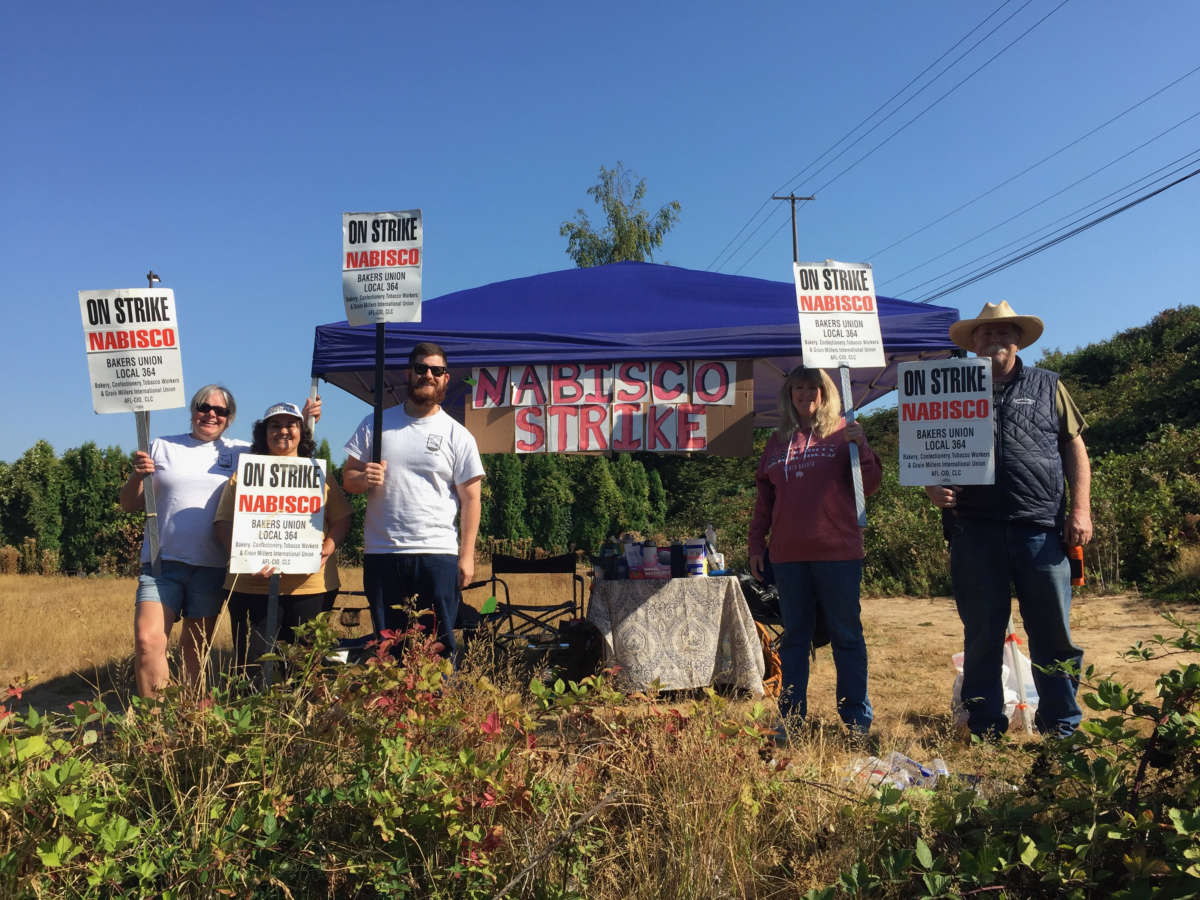A strike that started last month in Portland, Oregon and spread to other Nabisco bakeries and distribution centers across the United States ended Saturday after unionized workers voted “overwhelmingly” in favor of a new collective bargaining agreement.
Though some Portland employees opposed ratifying the four-year contract, calling for better terms, it ultimately garnered the necessary support from workers there and at facilities in Aurora, Colorado; Richmond, Virginia; Chicago, Illinois; and Norcross, Georgia.
Anthony Shelton, president of the Bakery, Confectionery, Tobacco Workers, and Grain Millers International Union (BCTGM), confirmed the agreement with Nabisco’s parent company, Mondelez International, in a statement Saturday.
“This has been a long and difficult fight for our striking members, their families, and our union,” Shelton said. “Throughout the strike, our members displayed tremendous courage, grit, and determination.”
The Nabisco strike is over! Congratulations to these brave workers on their wins, may their determination and grit be an inspiration for workers everywhere https://t.co/DPkmGHomxI
— Kim Kelly (@GrimKim) September 18, 2021
Cameron Taylor, a business agent at BCTGM Local 364 in Portland, told The Oregonian on Saturday that about 75% of all members approved of the agreement with the snack giant, known for Oreo and Chips Ahoy! cookies, as well as Ritz and other crackers.
“What my members wanted was to hold on to their benefits,” Taylor said, referencing that the deal scraps a new healthcare proposal and allows most workers to maintain their regular overtime schedule. He noted that “what the company did get was a weekend crew.”
While BCTGM Local 364 vice president Michael Burlingham told the Portland Mercury that he was “not surprised” by the vote “but it’s disappointing nonetheless,” both he and Taylor still framed the development as an improvement in conditions for workers.
The new agreement doesn’t kill Mondelez’s plan to implement 12-hour weekend shifts with no overtime, but that system would mostly apply to new workers who take “weekend crew” roles.
With votes in from all 5 U.S. bakeries, support for the deal was “overwhelming,” we were told.
— More Perfect Union (@MorePerfectUS) September 18, 2021
The strike “sent a message to all corporations that workers are not going to get pushed around, even if these corporations are multi-billion corporations,” said Taylor. “I think the strike was a success, we couldn’t accept what the company was stuck on… and we got them to move off of it.”
After the votes were counted, Darlene Carpenter, a business agent for the union’s Local 358 in Virginia, told the Richmond Times-Dispatch, “I’m ecstatic.”
“This is a major win,” Carpenter said, noting that workers will get a raise each year of the contract, higher company match to 401(k) contributions, and a $5,000 ratification bonus. “We have been like David, who took down Goliath, because people stood up for their beliefs.”
Carpenter signaled that workers at her location are equally happy about the outcome, adding that “I just got off the phone with one of the workers and she started crying because she was so ecstatic.”
Nabisco workers voted to ratify a new contract, ending the strike. Thank you to all who stood on the picket line and donated to the BCTGM Local 1 strike fund. When we stand in solidarity, we win! 🌹
— Chicago DSA 🌹 (@ChicagoDSA) September 19, 2021
Glen Walter, Mondelez’s executive vice president and president of its North America operations, said that the company was “pleased” to reach an agreement that will “provide our union-represented colleagues with good wages and competitive benefits, while also positioning our U.S. bakeries and sales distribution facilities for future growth and success.”
Amid the celebrations, Shelton acknowledged that the “striking members made enormous sacrifices in order to achieve a quality contract that preserves our union’s high standards for wages, hours, and benefits for current and future Nabisco workers.”
“Their sacrifice will benefit all BCTGM members and working people around the country for years to come,” he continued. “Those brothers and sisters who walked the picket lines day in and day out are true BCTGM heroes.”
The union leader also expressed gratitude for “the outpouring of fraternal support and solidarity we received from across the labor movement in the U.S. and around the world.”
Congratulations to @BCTGM Nabisco workers, who have won a contract that reflects the fair wages, hours & benefits they deserve.
Over the course of the strike, they made it clear: There is power in a union & we won’t back down. Good contract, good snacks. https://t.co/PIQURavQT1
— Liz Shuler (@lizshuler) September 18, 2021
“We offer our deepest gratitude to AFL-CIO president Liz Shuler for directing the full resources and power of the AFL-CIO at the federal, state, and local levels in support of our striking members and our union,” he said. “This support was critical to the success of the strike.”
“The BCTGM has shown, once again, that this union will do whatever it takes, make any sacrifice, take on any employer or adversary,” Shelton added, “in order to preserve the rights and jobs of our members and the standard of living of BCTGM families.”
Media that fights fascism
Truthout is funded almost entirely by readers — that’s why we can speak truth to power and cut against the mainstream narrative. But independent journalists at Truthout face mounting political repression under Trump.
We rely on your support to survive McCarthyist censorship. Please make a tax-deductible one-time or monthly donation.
